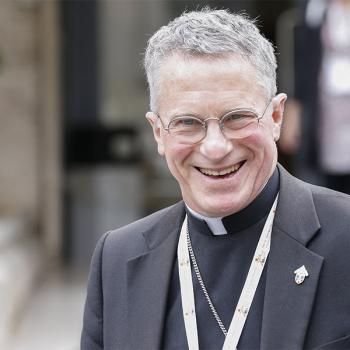This is Part Three of a three-part series of reflections on the lectionary gospel readings leading up to Advent. See the introduction to the series here.
 November 21
November 21
Luke 23:33-43
We left off last week with the stunningly beautiful prediction of the Coming of the Son of Man in Luke 21:25-28.
It's glorious, formidable, and redemptive. Today our text is the thief on the cross. In between then and now a lot of ugly and inglorious things have happened. They include a plot to kill Jesus (22:1-6), an embarrassing argument among his disciples over who is the greatest (22:24-27), Jesus' prediction of Peter's denial (22:31-34), Jesus weeping while his friends were sleeping in Gethsemane (22:39-46), his betrayal and arrest (22:47-53), Peter's denial (22:54-62), the mocking and beating of Jesus (22:63-65), his sentencing and, now, his crucifixion (23:1-44) between two criminals.
A friend of mine said to me recently, "Have you ever noticed that the further you go into Pentecost, the darker it gets?" Today our path has led us to a sad, dark place. Why would they choose this scene of brutal defeat for Christ the King Sunday?
Some notes on the passage:
Brendan Bryce, in his book The Hospitality of God: A Reading of Luke's Gospel, points out that Luke summarizes the grisly process of crucifixion in four words: "They crucified him there" (23:33). (Bryce, 181) In Luke 22:37, Jesus says, "For I tell you this scripture must be fulfilled in me, ‘And he was counted among the lawless.'"(See Is. 53:12.) In 23:33, as he is crucified between two criminals, this scripture finds its fulfillment. Bryce believes that the additional detail that he prayed, "Father, forgive them, for they do not know what they are doing" (v. 34a) fits Luke's tendency to depict Jesus at prayer. It is a fitting climax to his ministry of forgiveness. (Bryce, 181) He has offered it to so many seekers during his life, and now, on the brink of his death, he keeps the offer open.
Verse 34a: Luke intended Jesus' words to be echoed in those of Stephen as he forgives his executioners in Acts 7:60. Such forgiveness is an example to true disciples who seek to imitate their Lord.
Verse 34b: This is practically a quotation from Psalm 22:18: "They divide my clothes among themselves and for my clothing they cast lots." According to New Testament scholar E.J. Tinsley, it was the custom to crucify naked. (The Cambridge Bible Commentary on the New English Bible: The Gospel According to Luke, 201)John Wesley, in his Explanatory Notes on the New Testament on this passage, writes:
While they are actually nailing him to the cross, he seems to feel the injury they did to their own souls, more than the wounds they gave him; and, as it were, to forget his own anguish out of a concern for their own salvation. (Notes, 23:34)
Verses 37-38: The inscription over the cross mocks Jesus. Luke has depicted the real kingship of Jesus in his gospel so compellingly that he can be confident that readers will grasp the irony of this inscription. Tinsley, commenting on this passage, writes: "Jesus was never more king and savior than on the cross!"(The Cambridge Bible Commentary on the New English Bible: The Gospel According to Luke, 201)
It has been said that a person's last words summarize their priorities, personality, and perspective on life. Jesus' last words from the cross show us who he is, the identity of the savior for whom we're preparing.
(Note: If you want examples of famous people's last words, check the blog post I wrote on this topic a few months ago. I found some preachable insights in my research on famous people's last words.) Hence, John Wesley's "Best of all, Christ is with us." And Oscar Wilde's "Either that wallpaper goes, or I do." I've often thought it would be a good idea to practice something profound so I'm ready when the time comes.
In one community in which I served a church for seven years, every Good Friday from noon to 3 o'clock, we had a community service in which each of the pastors preached a meditation on one of the seven words of Christ from the cross. The Episcopal priest worked up a schedule and made sure nobody had to do the same word every year. In the course of my seven years in the community I got to preach on each one.
The first year I preached on the fourth word: "My God, My God, Why Hast Thou Forsaken Me?" (Matthew 27:46; Mark 15:34) In the first part of the sermon I focused on Jesus' genuine humanity and the fact that he took on every aspect of our human suffering, including the emotional experience of distance from God. In the second part of the sermon I dealt with the thought that people who don't have faith in God don't berate God for not showing up. They don't expect God to be anything but aloof. I mentioned that, in quoting Psalm 22:1 Jesus may have been implying the whole psalm, which ends on a note of praise for God's deliverance.





